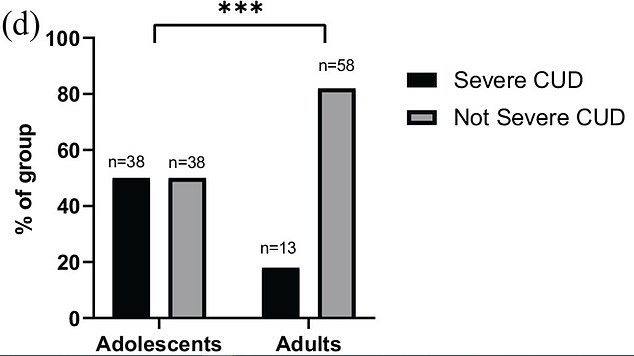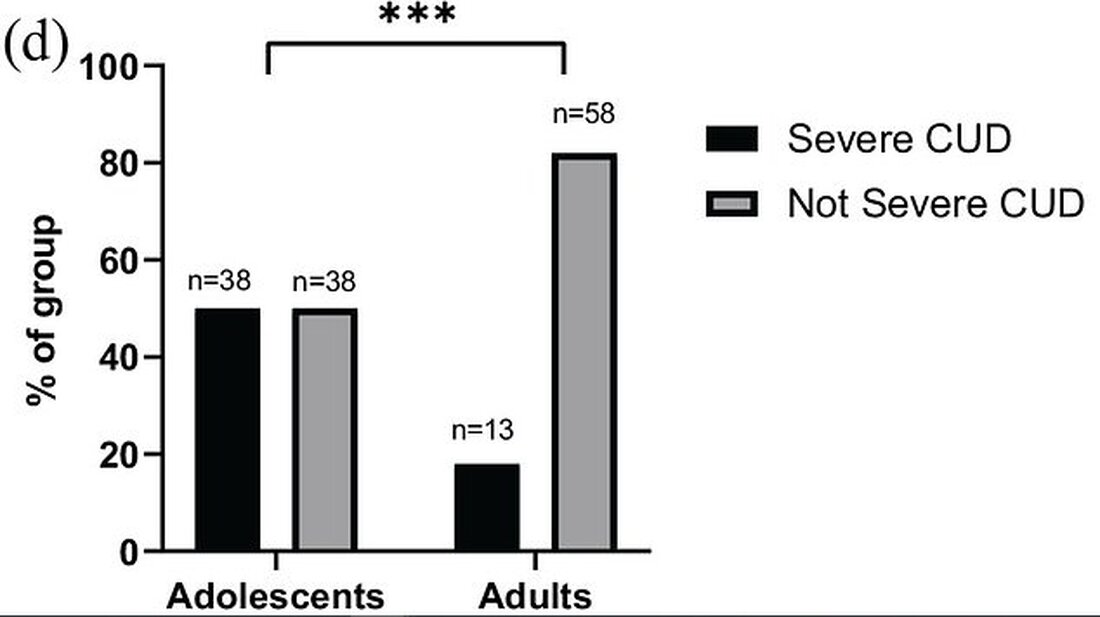Researchers have found that sixteen and seventeen year olds are three and a half times more likely to develop a cannabis addiction than adults.
Scientists at King's College London urged parents to "proactively discourage" their teenagers from smoking the drug.
They said teens were likely at higher risk of becoming addicted because their brains were still developing and they had an "evolving sense of identity."
The legal age to purchase cannabis in the United States is 21 and only applies in states where it is legal.

The graph above shows the proportion of adolescents (16 to 17 year olds) and adults (26 to 29 year olds) who were addicted to cannabis (black areas, labeled as severe cannabis use disorder or CUD). They probably had a much higher rate than adults because their brains are still developing

Several states have now legalized recreational use of cannabis, although not for people under 21
In the study, published in the Journal of Psychopharmacology, scientists monitored 274 people who used cannabis about four times a week.
The sample included 76 adolescents aged 16 to 17 and 71 people aged 26 to 29 who used the drug.
During the three months they were followed, participants completed questionnaires about how often they smoked cannabis and whether they suffered from symptoms of mental health problems.
Researchers found that teenagers who smoked cannabis were three and a half times more likely to be addicted than adults.
“Cannabis use disorder” is defined by symptoms including craving for the drug, use resulting in failure at school or work, increased tolerance, and interpersonal problems triggered by use.
Half of the teenagers surveyed (38 people) had six or more symptoms of this disorder, which puts them in the addiction category.
For comparison: this was less than a quarter of adults (13 people).
Dr. William Lawn, an addiction expert who led the study, said: “Given that young people are at greater risk of developing mental health problems than adults, they should be proactively discouraged from regular cannabis use.
“Cannabis addiction is a real problem that teenagers should be aware of as they appear to be much more susceptible to it than adults.
“The effects of cannabis use during adolescence on cognitive performance or on depression and anxiety may be weaker than previously thought.
“But we also replicated previous work that cannabis addiction can increase the severity of subclinical mental health symptoms.”
Teens may be more vulnerable to cannabis addiction because their brains are less developed, the researchers suggested.
It could also be because they still have an “evolving sense of identity” and a “more malleable” social life.
The study also found that neither adolescent nor adult cannabis users were more likely to develop depression or anxiety symptoms.
Lead author Professor Val Curran, UCL Clinical Psychopharmacology Unit, UCL Psychology & Language Sciences, said: “Our findings suggest that schools should teach students more about the addictive risk of cannabis, which has been neglected in drug education.
“Becoming addicted to cannabis is a serious problem in itself, but it can also increase the likelihood of other mental health problems.
“Young people should therefore be informed about their higher risk of addiction.”

 Suche
Suche
 Mein Konto
Mein Konto

